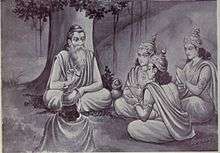Atreya

Atreya (आत्रेय) Rishi, or Atreya Punarvasu, was a descendant of Atri, one of the great Hindu sages (rishis) whose accomplishments are detailed in the Puranas. Sage Atreya was a renowned scholar of Ayurveda and six schools of early Ayurveda was founded based on his teachings. He is credited as the writer of Bhela Samhita, dating to a period of 6th century BCE. He is believed to have worked as the personal physician of King Nagnajit of Gandhara Kingdom, who finds mention in the Mahabharata.[1] The original contents of Charakasamhita are credited to Atreya, which were in turn codified and edited by Agnivesha and Charaka. According to Surendranath Dasgupta, The old Ayurveda of Atreya-Charaka school probably has its root in the now extinct Caranavaidya branch of Atharvaveda.[2]
Influences in Ayurvedic schools
According to the Charaka tradition, there existed six schools of medicine, founded by the disciples of the sage Punarvasu Ātreya. Each of his disciples, Agnivesha, Bhela, Jatūkarna, Parāshara, Hārīta, and Kshārapāni, composed a Samhitā. Of all the six, the one composed by Agnivesa was most revered. But, neither of them has survived.
Charaka later on, taking cues from Agnivesa Samhita, produced the now renowned work Charaka Samhita around 300 B.C. which survived and has been handed down to us in the form of Bower Manuscript dated around 4th century. Charaka Samhita is the foundational text of Ayurveda.
References
- ↑ Mohammad Ali Jazayery, Werner Winter (1988). Languages and Cultures: Studies in Honor of Edgar C. Polomé. Walter de Gruyter. p. 116.
- ↑ Surendranath Dasgupta (1922). A History of Indian philosophy. 1. p. 284.